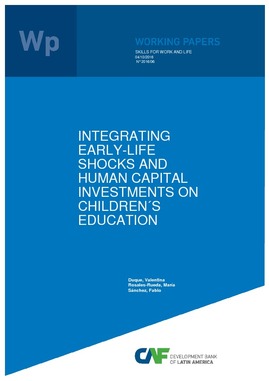Will you marry me, later? Age-of-marriage laws and child marriage in Mexico
Resumen
We provide empirical evidence on the impact of raising the minimum age of marriage to 18 years old on child marriage, early motherhood, and school enrollment in Mexico. Using a difference-in-differences model that takes advantage of the staggered adoption of this reform across states, we show that banning child marriage leads to a large and statistically significant reduction in the number of registered child marriages. However, we find no effect on school attendance or early fertility rates. We provide evidence that the mechanism behind these results is the substitution of formal marriage for informal unions. These findings suggest that when informal unions are a viable option for young couples, raising the minimum age of marriage is not enough to prevent early unions and their negative consequences.
Título paralelo
CAF - Working Paper #2020/09
Materia
Ciencia conductual | Cuidado infantil | Cultura | Desarrollo | Desarrollo social | Familia | Género | Mujer | Niñez
País / Región
Fecha
2020-11-03Citar de esta publicación
Item perteneciente a la Colección
Autor
Bellés-Obrero, CristinaLombardi, María
Items Relacionados
Integrating Early-life Shocks and Human Capital Investments on Children´s Education
This study investigates how early-life conditions interact with subsequent human capital investments to influence future educational outcomes. To provide ...
Early Childhood Care for Greater Well-being
The publication highlights the importance of ensuring proper care in early childhood to promote well-being and social equity in Latin America and the ...
Motherhood, Pregnancy or Marriage Effects
The existence of large child penalties on women’s labor market outcomes has been documented for multiple countries and time periods. In this paper, we ...



